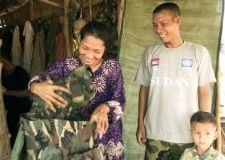Cambodia extends helping hand to Sudan
April 6, 2006 (OUDONG, Cambodia) — Tin You wears his standard issue gray T-shirt stamped with the word “Sudan” like a badge of honor.
 Still five time zones away from the African nation, the 40-year-old soldier is preparing for a mission that will make Cambodian history.
Still five time zones away from the African nation, the 40-year-old soldier is preparing for a mission that will make Cambodian history.
Tin You and more than 100 other soldiers from the war-ravaged Southeast Asian country that hosted the largest U.N. mission, in 1993, are about to don the blue berets of United Nations peacekeepers and help another country in need.
Sudan is almost 14 times the size of Cambodia, but the two have one thing in common: decades of civil war that left them among the countries most blanketed with land mines.
The Cambodian soldiers, all members of the army’s mine-clearing unit, will fly out in mid-April as part of a 135-person team to be stationed in the southern Sudanese city of Malakal along the White Nile River.
“Never before has Cambodia sent troops to help others, it’s always been the other way around,” said Tin You, based at the army’s mine-clearing headquarters in Oudong, 45 kilometers (28 miles) north of the capital Phnom Penh. “I’m excited about this mission.”
Twenty-six Cambodian troops are already in Sudan, preparing for the arrival of supplies and the full Cambodian army unit to join the United Nations Mission in Sudan, or UNMIS. The mission was set up to help implement a January 2005 peace agreement that ended a 21-year civil war between Sudan’s mostly Muslim north and the Christian and animist south.
For Ngin Sithon, 42, another Cambodian soldier, thinking about the mission makes him feel proud and a little nervous. He spent most of his adult life fighting in his country’s civil war and his trip will be his first by airplane and first to a foreign country.
“I used to see airplanes but have never flown in one,” he said, adding that he also worried whether the food would be good in Sudan.
“My wife is worried about me going away,” he said. “But I told her not to worry too much because at least we’re not going to fight any war there.”
During the U.N.’s 1993 mission to help Cambodia move from conflict to democracy, mine clearing operations were launched to make land available for refugees returning from camps near the Thai border. Cambodia’s civil war began in 1970 and ended over two decades later, following the genocidal Khmer Rouge rule and a 10-year occupation by Vietnamese troops.
Tens of millions of dollars (euros) in foreign aid were invested in building Cambodians’ capacity to remove land mines. The effort is slowly paying off by freeing land from the deadly scourge to allow poor peasants to farm and make a living.
An estimated 4 million to 6 million land mines and other unexploded ordnance from the decades of conflict still maim or kill Cambodians, mostly civilians.
“Cambodia now is making a very important gesture to the people and government of Sudan,” said Rupert Leighton, country manager of the Britain-based Mine Advisory Group, one of several humanitarian de-mining organizations in Cambodia. “It also raises the profile of Cambodia internationally.”
Some culture shock could await the Cambodian soldiers, from a predominantly Buddhist country, as they settle into the harsh living conditions of Africa’s largest country which, though mainly Muslim, is full of diverse ethnic groups speaking different dialects.
“No karaoke in Sudan. It is a very huge country with extremely poor infrastructure. It is much harder in Sudan than it is in Cambodia,” said Leighton whose group also works in mine-clearing in Sudan.
As part of the preparation, the Cambodian troops have been given some basic courses in English and Sudanese history, geography and culture, said Capt. Nong Ngoeuy, 44, a deputy commander for the team.
Tin You, the soldier, described his job as a dangerous one that requires constant focus.
“A split second of recklessness is very hazardous, and you have to remind yourself of the safety rules all the time,” he said. “I will miss my family. But it could dangerously affect my concentration if I spend too much time thinking about them while working with land mines.”
Getting off a training session at the army base, Tin You took off his protective helmet and flak jacket to relax with his wife and 5-year-old son in the front yard of their nearby home, a thatched hut off a provincial highway.
His wife, 30-year-old Sreng Hun, said she was proud of her husband.
“One year is a long time, but I don’t mind shouldering the family burden,” she said. “His mission is very important for the nation and for helping other people.”
(ST/AP)
___
On the Net:
United Nations Mission in Sudan: http://www.unmis.org
